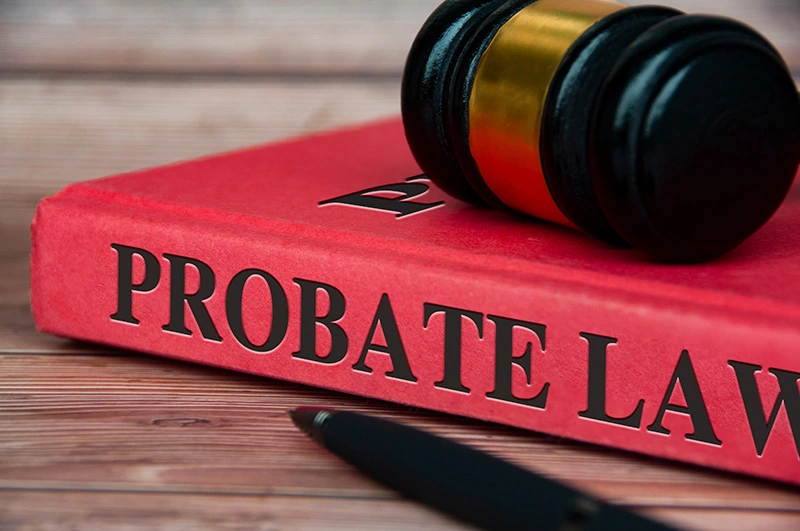Probate Lawyer Houston: Helping You Settle Your Estate Matters with Confidence.
Probate is the legal process where the court settles the debts and distributes the assets of an individual following their death. If there is a properly drafted will, the court will follow the directives of the will as closely as possible in distributing assets. If the will is not properly written or there is no will, state law is used to determine how the deceased’s assets are distributed. Most people are thrust into the probate process unexpectedly with little knowledge about how the process works.
Probate Lawyer
The probate of a will, whereby an individual’s estate is distributed to the beneficiaries following their death, can be both a complex and emotional process. When an individual’s estate and assets are up for division, friction can arise between parties, and it is essential that the estate is managed appropriately and the deceased’s wishes are honored.
All beneficiaries and interested parties involved in probate are aiming to ensure they receive the inheritance they believe they are entitled to. It is important to ensure that you are also protected and receive what you are entitled to from the estate.
Whether you are an executor, who must be represented by an attorney, or a beneficiary looking to protect your interests, Farias Law Firm, PLLC probate lawyers can help to secure a successful outcome for you and your family in the probate process.
Our experienced probate lawyers will look to protect your interests and address complications through both negotiation and, where necessary, litigation. Our priority is to ensure you receive a just and reasonable outcome. To schedule an initial consultation with a local probate attorney from Farias Law Firm, PLLC, call us at 713-364-3942.

Estate Planning
Estate planning is the process of outlining how you would like your property and estate assets divided after your death. This can include power of attorney, will writing, and advance directives and trusts. A comprehensive plan, developed alongside a reputable estate planning lawyer, can aid the probate process after you die and may ease the stress on your loved ones to administer your estate.
If someone dies without a will, this is known as an intestate. In this situation, the estate is distributed in line with Texas intestate laws. In addition to the initial disadvantage that the deceased person did not get to outline their wishes for their assets, the intestate probate process can be costly. The division of an estate without a will often requires a dependent administration, which in some circumstances, can use a substantial proportion of the assets in intestate to cover the legal probate costs, as opposed to going to the beneficiaries.
The Probate Process In Texas
Probate is the legal process whereby the assets of a deceased person are divided in line with their last will and testament. In most cases, Texas allows individuals to begin the process of probating a will up to 4 years after the date of the descendant’s death. If you do not probate a will within the 4-year timeframe, the estate will be divided in accordance with the Texas intestate succession process, as if the deceased person died without a will.
Opening Probate
To begin legal proceedings in the probate process, an application for probate must be filed with the Texas probate court in the county where the descendant resided. Anyone with a legitimate interest in the estate, such as a beneficiary, can file an application to begin probate.
The county clerk then issues notices that the administration of the estate has begun. Approximately two weeks after the initial application, a hearing is held in probate court where a Judge will legally recognize the descendant’s death, verify the will, and appoint the estate administrator.
Settling Outstanding Debts
Before assets can be divided between beneficiaries, the estate must settle any debts the descendant had outstanding. The executor will issue a notice of the descendant’s death to all creditors, allowing them to file a claim for unpaid debts against the estate. In Texas, creditors are usually notified through a notice in the local newspaper.
Outstanding debts could include mortgages, medical bills, household bills, and taxes, for example. All claims must be evaluated for legitimacy by the administrator before they are paid. Paying creditor claims is one of the first steps in the probate process. Many beneficiaries do not realize that all legitimate debts must be settled before the estate assets can be distributed to the beneficiaries.
Resolving Disputes
When an estate goes through probate, disputes can arise between family members, beneficiaries, and creditors. If a dispute or grievance is filed with the court, this must be resolved before probate can be completed.
Any litigation filed by potential beneficiaries or interested parties that contest the estate administration must be heard by a Judge in probate court. Disputes can be resolved between interested parties through negotiations with their attorneys, formal mediation, or at a hearing in probate court.
Dividing The Estate
If the descendant died without a valid will in place, the estate is distributed in line with Texas law. Probate law in Texas requires assets to be distributed to the descendant’s closest relatives if there is no will. Typically, this is the descendant’s spouse and children. In the absence of a spouse and children, the estate will be distributed to other close family members, such as parents and siblings.
Closing The Estate
The executor must issue final accounting to the probate court and every beneficiary that outlines the expenses charged to the estate for the administration process. The administrator must also submit an affidavit to the court outlining the division of assets and the expenses that were charged to the estate. Once this affidavit is submitted, this completes the role of the executor and closes the estate administration process.

Responsibilities Of The Executor
An executor or personal representative must exercise care, prudence, and diligence when handling the administration of the estate. They have a responsibility to ensure sufficient security and protection for the estate’s assets.
An executor cannot favor their own personal interests during the probate process, realize a profit from any business dealing with the estate or disclose information about the estate and its assets to unauthorized individuals. Specific duties of the estate executor include:
- Take an inventory and report all assets within the estate to the county clerk within 90 days of appointment
- Depending on the estate value, this can be a lengthy process
- Identify beneficiaries
- Notify all creditors
- Evaluate the legitimacy of creditor claims to the estate
- File tax returns for the estate and the descendant. Although, the state of Texas does not require the payment of inheritance taxes
- Cancel the descendant’s credit cards
- Notify the Social Security Administration regarding the payment of benefits
- Distribute assets in line with the descendant’s last will and testament or the Texas law of intestate succession
- Ensure that all actions taken by the executor during probate are for the benefit of the beneficiaries
What Situations In Probate Require A Lawyer?
With few exceptions, most cases of probating a will in Texas require legal counsel. In some situations, an individual may be considered to be practicing law without a license if they do not act through their attorney. In addition, probate law is complex and has many strict procedures that must be adhered to for a successful administration. Failure to follow these procedures can cause delays and additional costs and may result in the dismissal of your motion. To avoid complications, hire a probate lawyer to help you navigate probate state laws and procedures.
All executors are legally required to be represented by an attorney. It can be beneficial for all heirs and beneficiaries to seek legal representation too, to ensure their best interests are represented during the probate process. This becomes more important if complications and disputes arise.
Anyone raising a dispute or looking to file litigation should also seek legal counsel. If you are planning to file litigation against an estate, a skilled probate attorney is essential to increase your chances of a successful outcome and ensure that your concerns are addressed appropriately. The estate executor will be represented by an attorney who may argue your motion in order to protect the estate’s assets.
Probate litigation is complex, and often, the outcome of a dispute can impact all beneficiaries and heirs to an estate. If you are another beneficiary who may be affected by the outcome of litigation proceedings, hiring a probate attorney may be prudent. Likely, the individual filing the litigation will have legal representation, and if you do not, you could be vulnerable to a settlement or arrangement that is not in your best interests.

Probate Litigation
When disputes arise during the process of probating a will, sometimes litigation is the best course of action to address the issues. However, before filing a motion, a skilled probate attorney will always work with their client and the other parties involved to negotiate the concerns and attempt to find a solution without the involvement of the court.
If successful, these informal negotiations remove the additional time and cost implications associated with litigation. However, if the negotiations are unsuccessful, your lawyer should support you to take action through the probate court to address your concerns and secure a suitable outcome.
Contesting A Will
A dispute over the validity of a will is a common reason for complications in the probate process and can often result in litigation in probate court. A family member, beneficiary, or interested party may contest a will under specific grounds. In Texas probate law, there are four main grounds for an individual to contest a will, these are:
- Undue influence – If the individual signing the will has been placed under pressure or influence to sway their decision-making, this could be grounds for a dispute on the basis of undue influence. This may be suspected in situations of last-minute, unexpected changes to a will that do not seem like a logical decision for the deceased person to have made. For example, the inclusion of an unexpected beneficiary with a weak or unknown relationship with the deceased. Undue influence can be particularly challenging to prove in court and will require assistance from a skilled attorney.
- A lack of testamentary capacity – A will is a legally binding contract. As with any contract, all parties signing the will must be of sound mind and have the mental capacity to understand the contract they are signing. A will may be disputed under testamentary capacity grounds if it is thought that the person signing the will did not understand that they were signing their will, didn’t understand the property that the will included, or has no comprehension of the individuals listed to receive the assets.
- Due execution – Texas law outlines specific procedures and formalities that must be adhered to when a will is created and signed to ensure its validity in the eyes of the law. For example, the presence of witnesses when the will is signed. If an individual has grounds to believe that these processes were not adhered to when the will was signed, they can contest this in court.
- Other non-compliance with Texas law – The complexities of wills and estate planning can result in many potential errors or oversights that could mean that a will is not considered valid in the eyes of the law. If you have any concerns over a will, a probate attorney can review the specifics of your circumstances and advise if you have grounds for a dispute.
In every case of contesting a will, the individual filing litigation must present compelling evidence to the court to support their claims. Often, few people are present at the time of a will signing, so it can be challenging to prove specific circumstances.
Evidence such as medical records and testimony of the descendant’s mental capacity and behavior before death can support a claim. If you are looking to contest the validity of a will in Texas, representation from an experienced probate lawyer who can help you build a strong argument is essential.
Creditor Disputes
A creditor may begin litigation against an estate if their claim has been denied for a reason they disagree with. Similarly, a creditor may file litigation against an executor if they distribute the estate’s assets and leave legitimate credit claims unpaid.
Do I Need To Hire An Attorney To Probate A Will In Texas?
In almost all cases, you will need to hire an attorney to probate a will in Texas. If there is anyone named in will other than the person who applies for probate, the court considers the applicant to be practicing law without a license. If you are designated as an executor of an estate, you must be represented by an attorney in probate court.
How Much Does It Cost To Probate A Will?
The cost of probating a will depends on the complexity of the will and the size of the estate. The more creditors, assets and beneficiaries there are, the higher the cost. Disputes among beneficiaries and challenges to the will also drive up costs.
How Long Does The Probate Process Take?
A typical will takes between six months and a year but can go on for much longer. In general, the smaller the size and complexity of the estate, the quicker the process.
Is There A Deadline For Filing A Will For Probate?
With the exception of the Muniment of Title form of probate, Texas law allows you up to four years from the date of death to file a will for probate. After four years, the decedent is considered to have died without a will, and the court distributes assets according to Texas law.
What Happens If The Deceased Did Not Have A Will?
When there is no will, the Probate Code is used to identify heirs and designate the size of each heir’s inheritance. Forms of probate used when there is no will include:
- Affidavit of heirship
- The court created independent administration
- Dependent administration
- Determination of heirship
- Small estate affidavit
The form of probate used will depend on the size of the estate and the amount of debt owed by the decedent.
I Have Concerns About The Personal Representative’s Management Of The Estate. What Should I Do?
The personal representative or executor of the estate has a responsibility to the estate’s beneficiaries to responsibly manage the estate in line with the beneficiaries’ best interests. If you have reason to believe that the executor has breached their fiduciary duty to the estate beneficiaries, you may be able to file a lawsuit. A lawsuit could remove the executor from their position and recover the expenses they may have cost the estate.
Beneficiaries can begin legal recourse against an executor for many reasons. These include if the executor endangered the estate through risky investments, misappropriated assets for personal gain, mismanaged assets, or displayed favoritism amongst beneficiaries.
If you are a personal representative, you have a legal duty to the beneficiaries, and a breach of this duty could result in litigation against you. As such, reputable legal counsel is essential to ensure you are acting upon sound advice and in line with the beneficiaries’ best interests to protect yourself from litigation throughout the process.
Are Any Assets Exempt From Probate In Texas?
In most situations, probate is necessary for any assets with a title or deed. Some assets can be established to automatically transfer to the named beneficiaries upon death, which removes the requirement for probate for that asset. This could include assets held in joint tenancy with two people listed on the deeds and community property with the right of survivorship.
Other assets that usually do not need to be probated include payable-on-death bank accounts, benefits from life insurance policies, pension plans, and retirement accounts with named beneficiaries.
How Can Farias Law Firm, PLLC Probate Attorneys Help
In something as complicated as probating an estate, efficient communication between an attorney and their client is crucial for a successful outcome. At Farias Law Firm, PLLC, our attorneys are fluent in both English and Spanish and do not rely on translators. This allows us to communicate effectively with our clients, understand their concerns and needs, and keep them informed about their cases at every step of the process.
We also provide mediation services which allow us to continuously sharpen our skills in negotiation, problem-solving, and consensus-building. This can be particularly beneficial in probate cases due to the sensitive nature of asset distribution and the often close and complicated relationships of those involved in an estate.
Where possible, we aim to secure successful outcomes without adding to tension and rifts between families. However, if necessary for a successful outcome, we will advocate aggressively for our clients and their best interests, both inside and outside the courtroom.
Whether you begin the process of probate immediately following a loved one or family member’s death or you wait until 3-years after their passing, the process is usually emotional and can bring back old feelings of grief and sadness. Combining the emotions associated with losing a loved one and the stress of probating a will can be challenging for anyone to manage.
The probate process carries a lot of pressure for both the executor and the beneficiaries, particularly if disputes arise. The help of an experienced probate attorney can alleviate some of that pressure and can help you rest assured that your best interests are protected through the process.
Contact Farias Law Firm, PLLC Today
Texas probate law is complex, and the nature of estate administration often raises complications and friction. The experienced and knowledgeable Farias Law Firm attorneys will help you protect your interests and successfully navigate the process as smoothly as possible.
To schedule an initial consultation, contact us today at 713-364-3942.
Se Habla Español.





